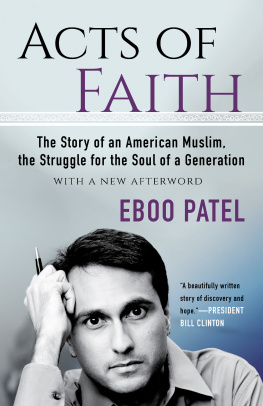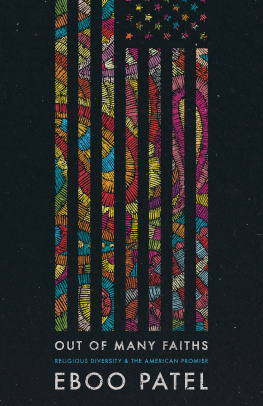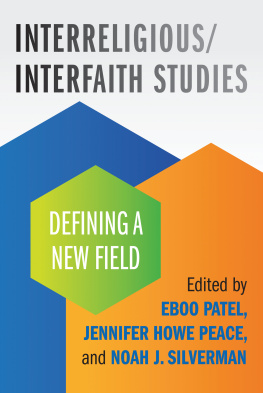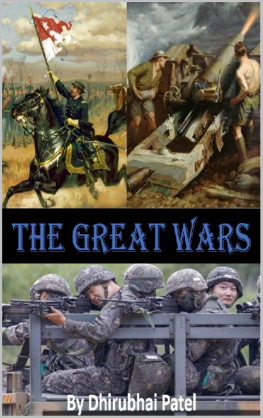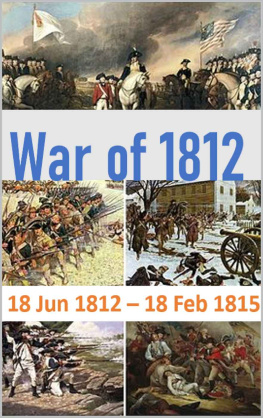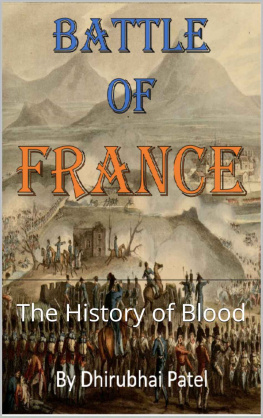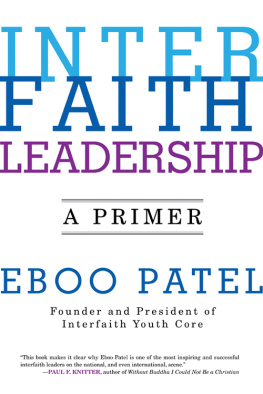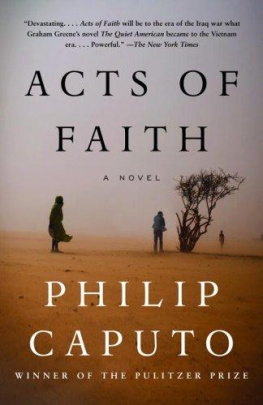Eboo Patel - Acts of Faith
Here you can read online Eboo Patel - Acts of Faith full text of the book (entire story) in english for free. Download pdf and epub, get meaning, cover and reviews about this ebook. year: 2020, genre: Politics. Description of the work, (preface) as well as reviews are available. Best literature library LitArk.com created for fans of good reading and offers a wide selection of genres:
Romance novel
Science fiction
Adventure
Detective
Science
History
Home and family
Prose
Art
Politics
Computer
Non-fiction
Religion
Business
Children
Humor
Choose a favorite category and find really read worthwhile books. Enjoy immersion in the world of imagination, feel the emotions of the characters or learn something new for yourself, make an fascinating discovery.
- Book:Acts of Faith
- Author:
- Genre:
- Year:2020
- Rating:5 / 5
- Favourites:Add to favourites
- Your mark:
- 100
- 1
- 2
- 3
- 4
- 5
Acts of Faith: summary, description and annotation
We offer to read an annotation, description, summary or preface (depends on what the author of the book "Acts of Faith" wrote himself). If you haven't found the necessary information about the book — write in the comments, we will try to find it.
Acts of Faith — read online for free the complete book (whole text) full work
Below is the text of the book, divided by pages. System saving the place of the last page read, allows you to conveniently read the book "Acts of Faith" online for free, without having to search again every time where you left off. Put a bookmark, and you can go to the page where you finished reading at any time.
Font size:
Interval:
Bookmark:


To the teachers, to the storytellers
I am large, I contain multitudes.
WALT WHITMAN
The roar of Creation
Resolves into music.
RABINDRANATH TAGORE
Start a huge, foolish project, like Noah.
RUMI
Someone who doesnt make flowers makes thorns. If youre not building rooms where wisdom can be openly spoken, youre building a prison.
SHAMS OF TABRIZ
Eric Rudolph is in court pleading guilty. But he is not sorry. Not for the radio-controlled nail bomb that he detonated at New Woman All Women Health Care in Birmingham, Alabama, that killed an off-duty police officer and left a nurse hobbled and half-blind. Not for the bomb at the 1996 Olympics in Atlanta that killed one, injured dozens, and sent shock waves of fear through the global community. Not for his hate-spitting letter stating, We declare and will wage total war on the ungodly communist regime in New York and your legislative bureaucratic lackeys in Washington, signed the Army of God. Not for defiling the Holy Bible by writing bomb in the margin of his copy.
In fact, Rudolph is proud and defiant. He lectures the judge on the righteousness of his actions. He gloats as he recalls federal agents passing within steps of his hiding place. He unabashedly states that abortion, homosexuality, and all hints of global socialism still need to be ruthlessly opposed. He does this in the name of Christianity, quoting from the New Testament: I have fought the good fight, I have finished my course, I have kept the faith.
Felicia Sanderson lost her husband, Robert, a police officer, to Rudolphs Birmingham bomb. During the sentencing hearing, she played a tape of speeches made at her husbands funeral. People remembered him keeping candy for children in his patrol car and raising money to replace Christmas gifts for a family whose home had been robbed. Felicia Sanderson pointed to Rudolph and told the court, He has been responsible for every tear my sons have shed.
Judge C. Lynwood Smith sentenced Rudolph to two life terms, compared him to the Nazis, and said that he was shocked at Rudolphs lack of remorse. But many others felt a twitch of pride.
Eric Rudolph might have been a loner, but he did not act alone. He was produced by a movement and encouraged by a culture. In the woods of western North Carolina, where Rudolph evaded federal agents for five years, people cheered him on, helped him hide, made T-shirts that said RUN RUDOLPH RUN . The day he was finally caught, a woman from the area was quoted as saying, Rudolphs a Christian and Im a Christian... Those are our values. These are our woods.
Of all the information published about Rudolph, one sentence in particular stood out to me: Rudolph wrote an essay denying the Holocaust when he was in high school. How does a teenager come to hold such a view?
The answer is simple: people taught him. Eric Rudolph had always had trouble in schoolfights, truancy. He never quite fit in. His father died when he was young. His mother met and followed a series of dangerous iconoclasts who preached a theology of hate. The first was Tom Branham, who encouraged the Rudolph family to move next door to him in Topton, North Carolina. Eric was soon drawing Nazi symbols in his schoolbooks at nearby Nantahala High School. Next, Erics mother moved the family to Schell City, Missouri, to be near Dan Gayman, a leading figure in the extremist Christian Identity movement. Gayman had been a high school principal and knew how to make his mark on young people. He assumed a fatherly relationship with Eric, enrolled him in Christian Identity youth programs, and made sure he read the literature of the movement. Gayman taught Eric that the Bible was the history of Aryan whites and that Jews were the spawn of Satan and part of a tribe called the the mud people. The world was nearing a final struggle between Gods people and Satans servants, and it was up to the conscious Aryans to ensure victory for the right race. Eric took to calling the television the Electric Jew. He carved swastikas into his mothers living room furniture. His library included virulently anti-Semitic publications such as The Protocols of the Learned Elders of Zion, Anne Franks Diary: A Hoax, and The International Jew. Under the tutelage of Gayman and other radical preachers, Eric Rudolphs hate did what hate always does: it spread.
I imagine these preachers felt a surge of pride when Rudolph responded to Judge Smiths question about whether he set off the bomb in Birmingham with a smug, I certainly did.
Middle school students in Whitwell, Tennessee, are giving tours of one of the most profound Holocaust memorials anywhere in the world: a German railcar that was used to transport Jews to Auschwitz. The young people ask guests to imagine how it might feel to be one of the seventy or eighty Jews packed into that tight space, hearing the wheels clanking as the train took them to torture and death. They explain that the railcar is filled with millions of paper clips, each one a symbol of a Jew murdered by the Nazis. One student says that to see a paper clip now is to think of a soul. The sign at the entrance of the memorial reads: We ask you to pause and reflect on the evil of intolerance and hatred. The sign on the way out states: What can I do to spread the message of love and tolerance these children have demonstrated with this memorial?
One Whitwell student tour guide, about to graduate from eighth grade, reflects, In the future, when I come back and see it, knowing that I was here to do this, it will be not just a memory, but kind of like in your heart, that youve changed the way that people think about other people.
Whitwell is a town of fewer than two thousand residents, located outside Chattanooga in the coal mining region of southeastern Tennessee, about a hundred miles from where the Ku Klux Klan was born. It has two traffic lights and a whole lot of GOD BLESS AMERICA signs. The mines closed thirty years ago, leaving the region even poorer than it was before. You can count the number of black and Latino families in Whitwell on two hands, and you wont need any of those fingers to count the number of Catholics, Jews, and Muslims, because there arent any.
Why would white Protestant kids in a poor region with a history of prejudice care so much about educating people about Judaism? The answer is simple: people taught them. The principal of Whitwell Middle School, Linda Hooper, wanted the students in her school to learn about cultures and people who are different from themselves. Our children, they are respectful; they are thoughtful; they are caring. But they are pretty much homogeneous. When we come up to someone who is not like us, we dont have a clue.
She sent a teacher to a diversity conference, and he came back with the idea of a Holocaust education project. This was our need, Hooper said.
Over the next several years, the students at Whitwell studied that horrible time, met with Holocaust survivors, learned about the rich tradition of Judaism, and taught all the people they touched about the powerful role that young people can play in advocating for pluralism.
Lena Gitter, a ninety-five-year-old Holocaust survivor, heard about the project and wrote the students a letter: I witnessed what intolerance and indifference can lead to. I am thankful that late in life I can see and hear that the teaching of tolerance is alive and well and bears fruit. When you ask the young, they will do the right thing. With tears in my eyes, I bow my head before you. Shalom.
Font size:
Interval:
Bookmark:
Similar books «Acts of Faith»
Look at similar books to Acts of Faith. We have selected literature similar in name and meaning in the hope of providing readers with more options to find new, interesting, not yet read works.
Discussion, reviews of the book Acts of Faith and just readers' own opinions. Leave your comments, write what you think about the work, its meaning or the main characters. Specify what exactly you liked and what you didn't like, and why you think so.

